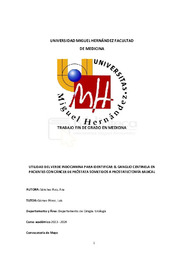Please use this identifier to cite or link to this item:
https://hdl.handle.net/11000/33902Utilidad del verde indocianina para identificar el ganglio centinela en pacientes con cáncer de próstata sometidos a prostatectomía radical
| Title: Utilidad del verde indocianina para identificar el ganglio centinela en pacientes con cáncer de próstata sometidos a prostatectomía radical |
| Authors: Sánchez Ruiz, Ana |
| Tutor: Gómez-Pérez, Luis |
| Editor: Universidad Miguel Hernández |
| Department: Departamentos de la UMH::Patología y Cirugía |
| Issue Date: 2024-05-12 |
| URI: https://hdl.handle.net/11000/33902 |
| Abstract: INTRODUCCIÓN. El cáncer de próstata es la neoplasia más frecuente en hombres. Uno de los tratamientos de esta enfermedad cuando está localizada es la prostatectomía radical, que se acompaña de linfadenectomía pélvica extendida si el riesgo de afectación ganglionar preoperatorio calculado con el nomograma de Briganti es >7%. Sin embargo realizar la linfadenectomía supone mayor tasa de complicaciones, mayor estancia hospitalaria y prolongación del tiempo de cirugía sin demostrar impacto sobre la supervivencia. Como alternativa a la linfadenectomía se está empleando en algunos centros la técnica de ganglio centinela guiada con verde indocianina con resultado no concluyente. OBJETIVOS. Puesta en marcha y evaluación de la utilidad del verde indocianina (ICG) mediante inyección intraprostática para localizar el ganglio centinela en pacientes con cáncer de próstata y riesgo de afectación superior a 7% en nomograma de Briganti. Secundario: Determinar si al identificar el ganglio centinela la técnica es eficaz para detectar todas las metástasis ganglionares. METODOLOGÍA. Se plantea un estudio observacional descriptivo a un año. La población a estudio son pacientes con cáncer de próstata diagnosticados en el Servicio de Urología del Hospital General Universitario de Elche con riesgo de afectación linfática > 7% según nomograma de Briganti. El tamaño muestral es de 104 pacientes. Aunque este trabajo es una experiencia preliminar con un tamaño muestral menor (n=1). Una vez realizada la cirugía (linfadenectomía pélvica extendida con inyección de verde indocianina + prostatectomía radical) se han recogido los datos de la historia clínica para ser posteriormente analizados mediante un análisis de curva ROC, la sensibilidad y especificidad de la prueba. RESULTADOS. El paciente presentaba un riesgo afectación ganglionar de 10% según nomograma de Briganti 2019, con estadio cT2N0M0 previo a cirugía. El verde indocianina tiñó el ganglio centinela y otros 6 ganglios. Tras la exéresis del ganglio centinela se realizó la linfadenectomía pélvica extendida resecándose en total 15 ganglios. El ganglio centinela resultó negativo (libre de tumor) y la linfadenectomía pélvica extendida también resultó negativa. Tras la cirugía el estadio del paciente fue pT2N0M0. CONCLUSIONES. La detección del ganglio centinela mediante la inyección intraprostática de verde indocianina es una técnica sencilla y factible. El análisis de la muestra estimada permitirá extraer conclusiones acerca de su eficacia y fiabilidad. INTRODUCTION. Prostate cancer is the most common neoplasm in men. One of the treatments for this disease when it is localized is radical prostatectomy, which is accompanied by extended pelvic lymphadenectomy if the preoperative risk of lymph node involvement calculated with the Briganti nomogram is >7. However, performing lymphadenectomy entails a higher rate of complications, longer hospital stay and prolongation of surgery time without demonstrating an impact on survival. As an alternative to lymphadectomy, the indocyanine green-guided sentinel lymph node technique is being used in many centers. OBJECTIVES. Implementation and evaluation of the usefulness of indocyanine green (ICG) by intraprostatic injection to locate the sentinel lymph node in patients with prostate cancer and risk of involvement greater than 7% in Briganti nomogram. Secondary: Determine if by identifying the sentinel lymph node the technique is effective in detecting all lymph node metastases. METHODOLOGY. A one-year descriptive observational study is proposed. The study population is patients with prostate cancer diagnosed in the Urology Service of the General University Hospital of Elche with a risk of lymphatic involvement > 7% according to Briganti nomogram. The sample size is 104 patients. Although this work is a preliminary experience with a smaller size (n=1). Once the surgery was performed (extended pelvic lymphadenectomy with indocyanine green injection + radical prostatectomy), the data from the clinical history were collected to be subsequently analyzed using a ROC curve analysis, the sensitivity and specificity of the test. RESULTS. The patient had a 10% risk of lymph node involvement according to Briganti 2019 nomogram, with stage cT2N0M0 prior to surgery. Indocyanine green stained the sentinel lymph node and 6 other lymph nodes. After excision of the sentinel node, extended pelvic lymphadenectomy was performed, resecting a total of 15 nodes. The sentinel lymph node was negative (tumor free) and the extended pelvic lymphadenectomy was also negative. After surgery, the patient's stage was pT2N0M0. CONCLUSIONS. Detection of the sentinel node by intraprostatic injection of indocyanine green is a simple and feasible technique. The analysis of the estimated sample will allow conclusions to be drawn about its effectiveness and reliability. |
| Keywords/Subjects: Verde indocianina neoplasias de la próstata ganglio centinela linfadenectomía pélvica extendida |
| Knowledge area: CDU: Ciencias aplicadas: Medicina |
| Type of document: info:eu-repo/semantics/bachelorThesis |
| Access rights: info:eu-repo/semantics/openAccess Attribution-NonCommercial-NoDerivatives 4.0 Internacional |
| Appears in Collections: TFG- Medicina |
.png)

